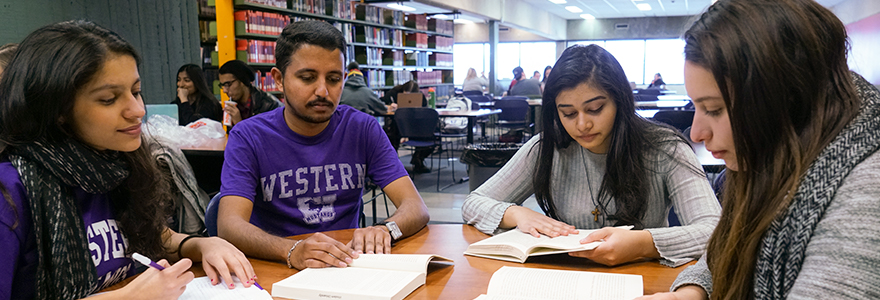Academic Integrity
 Academic Integrity can be defined as the commitment to submitting your own academic work that does not include other individuals’ ideas and/or research. Remember, if such information is required within your work, the correct form of citation needs to follow. The intent of Academic Integrity is to uphold Western University’s moral code and code of ethics that encourage all students to complete their education with honesty, trustworthiness, fairness, respect and responsibility (CAI, Fundamental Values Project, 1999).
Academic Integrity can be defined as the commitment to submitting your own academic work that does not include other individuals’ ideas and/or research. Remember, if such information is required within your work, the correct form of citation needs to follow. The intent of Academic Integrity is to uphold Western University’s moral code and code of ethics that encourage all students to complete their education with honesty, trustworthiness, fairness, respect and responsibility (CAI, Fundamental Values Project, 1999).
Cheating, plagiarism and unauthorized collaboration are strictly prohibited.
You are responsible for understanding the expectations of Canadian Universities and the University’s Scholastic Offense Policy for both undergraduate and graduate students. Your culture may define cheating and plagiarism differently but both intentional and unintentional cheating or plagiarism will result in an academic penalty. Ignorance of the Policy is not a defense.
What is Cheating?
Western University defines cheating as dishonest behaviour intended to gain academic advantage.
Some examples of cheating include:
- giving someone answers during a test
- looking at someone else’s test
- bringing a 'cheat sheet' (a page of information) to a test, even if you do not use it
- submitting an assignment that you have previously submitted for another class
- using data or references that you know to be false in a lab report, essay or other assignment
What is Plagiarism?
Plagiarism is using another person’s work without acknowledging that the work is not yours. Another person’s words must appear within quotation marks and you must cite sources even when you have paraphrased another person’s ideas into your own words. Learn more about plagiarism.What is Unauthorized Collaboration?
Unauthorized collaboration happens when students work with and/or receive help from someone (a friend, classmate, parent, etc.) without the specific permission of the instructor on assignments that will be submitted for a grade. Unauthorized collaboration applies to in-class and take-home tests, labs, essays and assignments. Students may not collaborate without faculty permission.Citations and Sources
All sources must be cited. Sources are:
- published works such as books, magazines, newspapers, websites, plays, movies, photos, paintings and textbooks
- unpublished works such as class lectures, class notes, class handouts, speeches, other students’ papers and materials from a research service
Ask your professor what citation format they prefer. For information on different citation styles, visit the Western Libraries' page on citations. For help writing citations visit the SDC's Writing Support Centre.
Consequences of Cheating, Plagiarism and Unauthorized Collaboration
Cheating, plagiarizing and unauthorized collaborating can result in:
- receiving a zero on your assignment or test
- failing your course
- suspension or expulsion from Western (for repeat offenders)
For more information about the consequences of committing a scholastic offense please see the University's Scholastic Discipline for undergraduate and graduate students.
Learn more about Academic Integrity at Western University.
If you have been accused of an academic offense and wish to find out more information about what your options are, learn more on the Office of the Ombudsperson's website.
The information on this page is taken from:
Cheating, Plagiarism and Unauthorized Collaboration: What Students Need to Know. Office of the Ombudsperson. The University of Western Ontario, July 2009.


